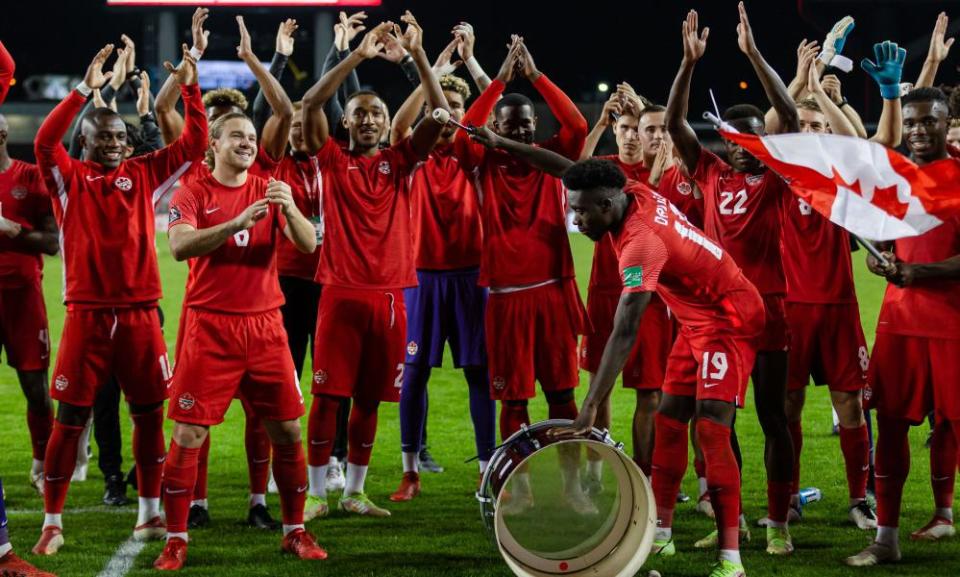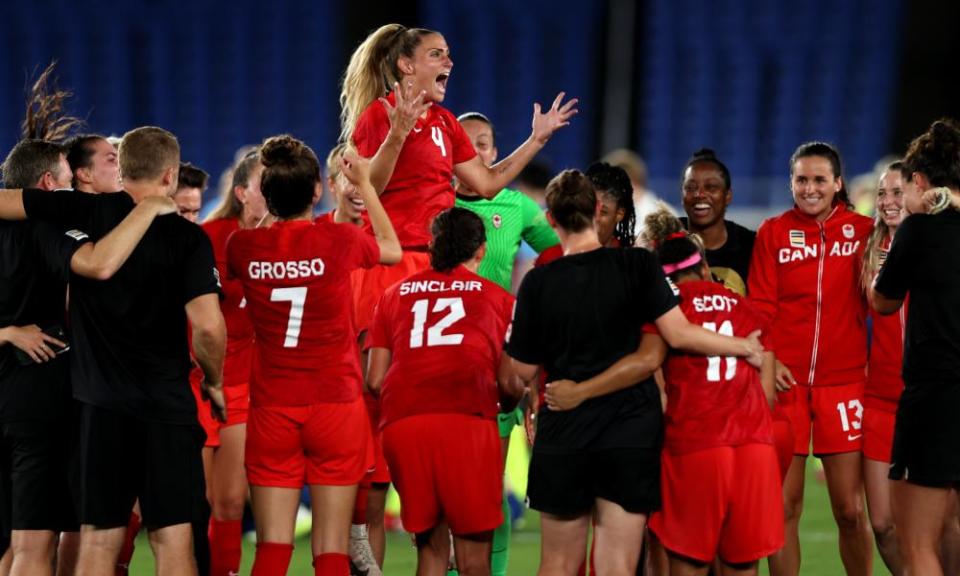Olympic gold to Qatar 2022? Canada is in danger of becoming a football nation

In keeping with the times, Bill Manning did his own research.
Toronto FC’s president was inspired in his online trawling not by pandemic conspiracies but Canada’s sporting past.
Manning’s stunning and successful pursuit of Napoli and Italy star Lorenzo Insigne ended earlier this month with the winger becoming the richest recruit in Major League Soccer history. It began with Manning in front of a laptop scouring transfermarkt.com for the kind of stop-the-world signing that this moment in Canadian football was calling for, if not demanding.
“Lorenzo Insigne is going to be a player that people want to come see,” Manning said when the deal, which sees Insigne paid $15m a year over the next four years, was confirmed. “We think the World Cup here in Toronto in 2026 [is] going to be a transformational moment for this sport in this country and we want to be at the forefront.”
The transfer’s ambition and execution was impressive. But Manning might have still been a little off on one of his numbers. That transformational moment may come a whole lot sooner than the summer of 2026. In truth there’s a feeling in Canada that over the past six months, it has already begun.
In August the Canadian women’s team claimed historic Olympic gold in Tokyo. Then the men’s team continued their emergence as the most improved side in the world. When you add in the Insigne coup, this has been a period without parallel north of the 49th. On the eve of a six-day international window which could end with Canada qualifying for a men’s World Cup for the first time since the 1980s, the idea that Canada has now become a football nation is inching away from provocative quote tweet territory and towards reality.
“It’s the definition of serious momentum, isn’t it?” Steven Caldwell told the Guardian this week. “There’s no other way to look at it than to say that the sport in this country is at the highest point it’s ever been.”
Related: The English manager at the heart of Canada’s Olympic football glory
Caldwell, like many in and around the Canadian game, is a blow-in. First, second and next-generation Canadians have long clawed for football’s place in the sporting hierarchy here. Caldwell has called the country home for nine years but is particularly well-placed to survey the change. The former Scotland defender also captained Toronto FC, is an analyst for Canadian network TSN and was part of the Canadian men’s backroom team as recently as last summer.
“To see that national team success – women’s and men’s – that aspirational value of seeing a team win a gold medal or atop the final qualifying stage for a World Cup, it’s incredible,” Caldwell said. “[TFC owners] MLSE have felt the moment. Insigne coming to TFC is a byproduct of the successes of the national teams, particularly the men’s. The fact that they’re tracking towards the World Cup and there’s this fervour, viewing figures through the roof, that excitement of what’s next, MLSE don’t want to miss out on that.”
Where Manning’s first-Insigne-and-then-the-world energy might have been scoffed at not too long ago, it’s now, rightly, lauded. MLSE also own the NBA’s Raptors and Toronto’s most etched-in-ice (and infamy) team, the NHL’s Maple Leafs. Insigne’s contract will see him rival most of the highest-paid Raptors and eclipse every Leafs player. A gamble? Perhaps. But also a sign of the times. And maybe a more permanent change.
John Herdman and his team of effervescent youth, stubborn and sturdy experience and all focus and heart won minds and eyes too as they took early control of the final stage of Qatar 2022 qualifying over the fall.
The numbers tell the tale: when Alphonso Davies lit up Toronto with an electrifying goal to down Panama in October, the TV audience was 342,000. The following month when Jonathan David grabbed the only goal against Costa Rica that number doubled. Four days later a landmark was passed when almost 1.2 million watched the historic 2-1 triumph over Mexico on a frigid night in Edmonton.

“The game against Mexico was up there with NHL games going on at the same time,” Adam Seaborn, a Toronto-based sports marketing and audience expert, told the Guardian. “What it tells me when you go to such a big number in such a short space of time, is something we have seen here before – when a Canadian story emerges, viewership can spike dramatically. The country loves a Canadian story and it becomes a big thing.”
Herdman is a coach and leader who leans into narratives and plotlines. He discusses themes as freely as teams, litters press conferences with talk of moments and missions. At the start of qualifying he spoke to the Guardian about proving that “a guy who’s read 400 books is [as capable of succeeding as a coach] as a guy who’s played 400 games.”
Canada's Sam Adekugbe really dived into the snow after Cyle Larin got his brace 🤣
(via @CBSSportsGolazo) pic.twitter.com/1fifNSu1Tx— B/R Football (@brfootball) November 17, 2021
So far, he has. Never more so than in November when Edmonton’s Commonwealth Stadium became the Iceteca and Mexico froze in the frenzy. Defender Sam Adekugbe’s celebratory dive into a pitch-side snowbank instantly became what is known in these parts as a Canadian heritage moment.
The country continues to buy in. Sunday’s meeting with the US in Hamilton (sandwiched between away games against Honduras and El Salvador) sold out before tickets even went on general sale. With Drake and Justin Trudeau clamouring for a selfie, Davies is becoming the kind of cultural, crossover star that no male footballer has ever come close to being here.
Caldwell marvels at how far the men’s team has come. While the women’s team, who Herdman coached before switching jobs, kept the fire burning for so long, their male counterparts floundered. Not just decades in the wilderness after their solitary World Cup appearance in 1986 but fresh nadirs even in the past decade, an 8-1 humbling by Honduras in 2012 the lowest low.
“Playing for Scotland, you know your gran is watching, everyone is watching the country,” Caldwell said. “When I came here to Canada I never had that feeling. I never even knew there were national team games on. I’d wonder where a couple of my teammates [had] gone. I couldn’t believe it.”
When Herdman took over in 2019, Canada were 94th in the men’s rankings, just above the Faroe Islands. When 2021 finished, they were 40th, named Fifa’s most-improved side, sat top of Concacaf qualifying as its top scorers, joint-best defence and only unbeaten side.
What’s perhaps most impressive is that Herdman and his staff have taken a gifted young generation who don’t carry the scars of the past and blended it with some who do: their 39-year-old captain Atiba Hutchison is healing and defying age in midfield. Herdman has also unearthed gems who’ve caught the eyes of Europe’s elite.
Even since that Mexico game, winger Tajon Buchanan linked up with Club Brugge and midfielder Stephen Eustáquio joined Porto. Lille striker David is likely to soon join Bayern Munich’s Davies among the upper, upper echelon.
In such a pivotal three-game window and with so much on the line, the loss of Davies (due to Covid complications) for the upcoming matches could have crushed previous Canadian generations. Not so this one.
“The collective sum of their parts is what they live by, so I don’t think they’ll be fazed,” insisted Caldwell. “They believe 100% that they can win the group and that’s important. It’s all about proving that point.
“John has done great things in terms of the culture. These guys understand that it’s about the code of the shirt and a nation, getting to change the game forever in this country.”

 Yahoo Sport
Yahoo Sport 





































